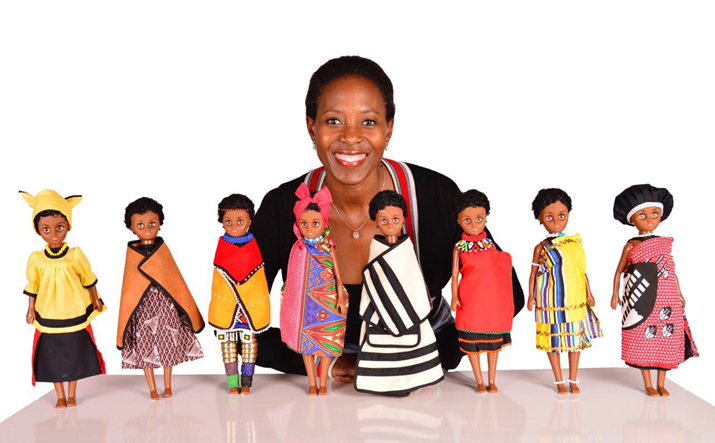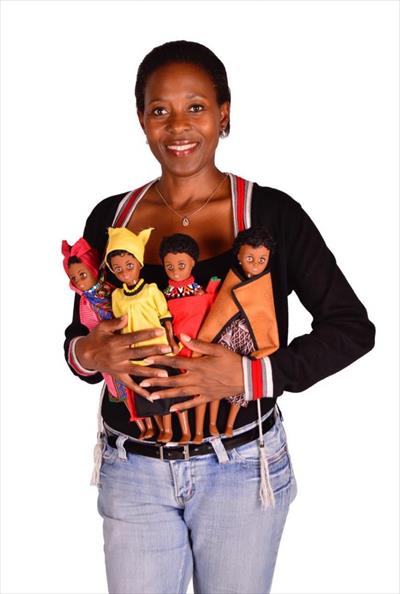|
|||||||||||
|
|
| Dolls Are Us |
| South African entrepreneur brings new faces to the doll market |
| By Lu Anqi | VOL.9 November 2017 |

Molemo Kgomo was a frustrated mother back in 2005. The search for an attractive African doll for her young daughter to play with would always leave her empty handed. It was the very frustration that lit the spark for her business idea.
In the same year, the South African entrepreneur started Ntomb'enhle Dolls. Ntomb'enhle means "beautiful girl" in Zulu and the range of dolls represents South Africa and its neighboring countries.
Today, what began as a desire to provide her daughter with an African doll she could relate to is a growing business with customers around the world.
Idea to product
Ntom'benhle Dolls are conceptualized, designed and created by Kgomo. She designed the dolls as typical South African black girls reflecting the brown skin, brown eyes and short hair. The range has a collection of eight 36-cm-tall dolls, all dressed in traditional costumes representing eight of South African ethnic groups: Zulu, Sotho, Pedi, Swazi, Ndebele, Venda, Tsonga and Xhosa.
Kgomo believes that something as simple as a doll can not only help children understand their own cultural background, but also impact positively on their self-esteem. She says African dolls can play a role in the attitudes of young girls toward beauty and how they see themselves as adults in later life. In addition, the African dolls can nurture tolerance among people of different races and cultural backgrounds on the play ground, according to her. Kgomo is proud of her range of dolls and feels thankful that her business is growing. But behind the success is a stream of challenges she has had to overcome.
Previously a flight attendant with British Airways and South African Airways, Kgomo had chances to visit many countries. On her travels, she came across many black dolls in the U.S. Her mother who traveled a lot on business tours also found nice black dolls in Germany. But back in Africa, they were scarce and Kgomo felt that there was obviously a market for them.
With the idea in mind, she looked for doll manufacturers on the Internet and found many in Hong Kong, China. "I tried to find the one that I could go and see, and talk to. We made an appointment and I went to China to meet with the manufacturing people and told them what I wanted to do. And that's the way it got started," said Kgomo.
On her visit to China in 2005, she took a book called Vanishing Cultures of South Africa to help the manufacturer, who had never made a black doll before, know what it was she wanted.
While the dolls were being manufactured, Kgomo sourced local fabrics used to make the traditional outfits the dolls wear. She also enlisted the services of local women to produce the beadwork and accessories found on the Ndebele and Zulu dolls.
Online marketing

Kgomo sold her first batch of dolls through word of mouth as well as at her mother's guesthouse, but sales were discouraging. She was selling between 10 and 15 a month at the beginning. The excuses Kgomo received on a regular basis were that there was no demand and no market for them. For almost a decade, her first batch of dolls sat gathering dust in her garage.
"I just went with a hunch. When I look back at it now, I realize that the market for the black dolls was not ready in 2005," she said in retrospect.
"I had the products with me already, and I had to find another way to sell them and distribute them," she said, finally deciding to take her doll business online.
In just three months, her sales had more than doubled.
Kgomo said that the demand for black dolls in South Africa and the African market as a whole has grown in the past three years with more and more people becoming conscious of their origins and what their children play with. The dolls reflect the reality of their world.
Today, the Ntomb'enhle Dolls sells 150 to 200 units in a good month and the customer base is now global. While continuing to create her traditional dressed dolls, Kgomo is also working on new products in collaboration with another South African woman.
"The new range is going to have three styles: the evening look, the day look, and the casual look," she said. This is in response to requests for more modern fashionable dolls, which will see a December or early 2018 launch. Kgomo also plans to get her dolls into shops to make them more accessible to those who still don't have Internet access.
"At the moment, my dolls are not sold in any shops. I want to go into shops in South Africa and other countries. That is the goal and big picture I am working on," she said.
Looking back at the path she has traveled, Kgomo said that the most difficult aspect of starting up any business is to find the right market fit, and to source the startup funds.
"It is not always easy to get funds to start a business," she said. "If it is a loan, you have to consider how to pay it back. If you are not getting the sales, you are not going to [have money to] pay back. These are all struggles."
Getting supplies on time and worrying if they will be enough to meet demand are also her constant concerns. "But once you have overcome all these challenges, things get easier," she said.
"Starting a business is never an easy thing. But if you want to do something, and if you are passionate about what you want to do, then go for it," she said, adding that perseverance is the key.
"Just like the famous sports logo says, anything and everything is possible," said Kgomo.
(Reporting from South Africa)
|
||
|
|||
| Copyright ChinAfrica All right reserved 京ICP备08005356号 |